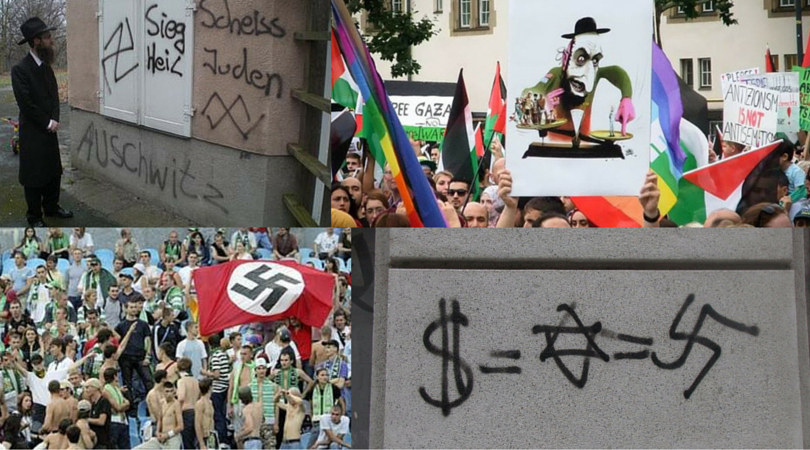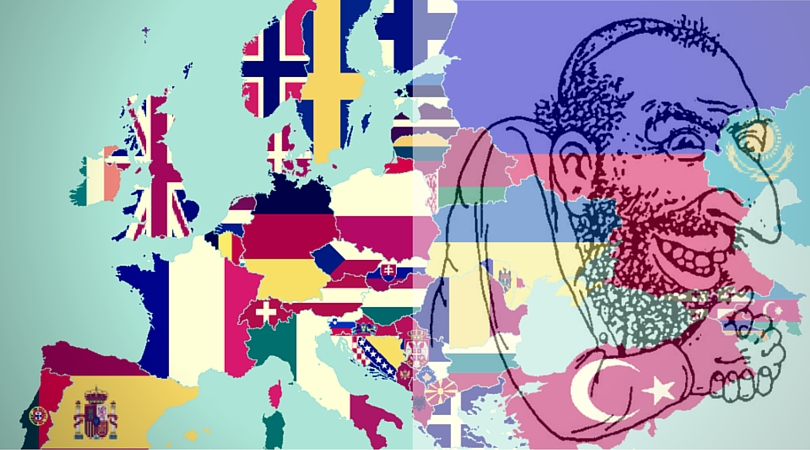(Originally published on Israel Hayom)
In Michel Houellebecq’s dystopian novel, “Submission” (2015), which takes place in an imaginary France in 2022, when the Muslim Brotherhood has won elections and rules the country in alliance with the Socialists, the non-Jewish protagonist, a professor at the Sorbonne, tells his Jewish student, who is escaping to Israel with her family, that there can be “no Israel for me.” This is one of the most poignant observations in the book.
Another is the protagonist’s reflection that the increasing violence, even the gunshots in the streets of Paris as a civil war threatens to explode during the run-up to the elections, has become the new normal: something that everyone is resigned to as an inevitable fact, barely reported in the media and treated as unremarkable by his fellow lecturers. Even after the Muslim Brotherhood wins the elections, and the Sorbonne is turned into an Islamic university, with all that this entails, his colleagues treat this development as nothing out of the ordinary. Houllebecq’s indictment against the silence and complicity of his fellow intellectuals in the face of the Islamist encroachments on French society is scathing. As a matter of course, in the new France, where freedom of speech comes at a prohibitive price, Houllebecq now has to live under 24-hour police protection. “Submission,” by the way, was published on the day of the Charlie Hebdo terrorist attacks.
The resignation and the precarious pretense that everything is normal in the face of rapidly deteriorating circumstances, is a predictable human reaction, testimony to the sometimes practical but lamentable human capacity for adaptation to most circumstances, whatever they may be. Historically, Jews have excelled in this discipline, simply because they had no choice. Just like Houllebecq’s protagonist, they had nowhere else to go. However, whereas there “can be no Israel” for the lost professor, today, unlike the last time Jews were threatened on a large scale in Europe, there is an Israel for the Jews. Uniquely among all the peoples of Europe, the Jews have a welcoming place to go. Nevertheless, the overwhelming majority of Western European Jews choose to stay put in Europe.
In 2015, 30,000 Jews made aliyah from all over the world. Almost 22,000 of these arrivals were from France, Russia and Ukraine, and approximately 3,700 new immigrants made aliyah from the United States and Canada. Other countries included Argentina and Venezuela, but Western Europe, outside of France, only accounted for the tiniest contribution to these figures.
From the Netherlands, home to an estimated 50,000 Jews, only 96 Jews made aliyah in 2015, still the highest figure recorded in a decade. In Belgium, which saw an Islamic terrorist attack on the Jewish museum in 2014, only 287 Jews made aliyah last year out of an estimated Jewish population of 40,000. Aliyah from the Scandinavian countries was equally negligible in 2015, despite a terrorist attack on the synagogue in Copenhagen in 2015 and a growing anti-circumcision lobby in all the Scandinavian countries, threatening to literally make a continued Jewish presence in those countries untenable. In 2014, kosher slaughter was made illegal in Denmark. In Sweden and Norway it was already outlawed.
In the Netherlands, the beginning of 2016 saw an extraordinarily savage anti-Semitic attack on a Jewish octogenarian couple in Amsterdam, who were robbed and beaten nearly to death while the Muslims who perpetrated the attack called them “dirty Jews.” The couple had to be confined to an old-age home, having sustained permanent injuries. Incredibly, the Dutch media, aided by the prosecution, upon reporting the crime, chose not to mention the strong anti-Semitic element of the hate crime. Anti-Semitism was also reported to be on the rise in Dutch schools, a dire foreboding for the future.
The situation all over the European continent is depressingly similar with the occasional fluctuations in the rise and fall of anti-Semitic incidents, but with a clear and persistent anti-Jewish and anti-Israeli sentiment that makes itself felt in everyday life. Recently, the president of the Jewish society at the London School of Oriental and African Studies explained that “we are too scared to go anywhere so we walk in a group to the station. People come up to me and say, ‘I heard you hate Palestinians.'”
Jews are particularly at risk from the rise of jihad on the continent, but they are also existentially threatened by the anti-Semitic campaigns against circumcision and kosher slaughter, which often have a broad popular base that defies any categorization of left and right. The Social Democratic government of Helle Thorning-Schmidt brought about the prohibition against kosher slaughter in Denmark in 2014.
Added to this is the threat from far-right groups, which is sometimes exaggerated yet nevertheless very much there. In the Netherlands, for instance, a Jewish organization, the Center for Information and Documentation on Israel, was pressing charges in May against supporters of the Dutch soccer champion PSV Eindhoven. A video was posted of PSV fans singing, “My dad was in the commandos, my mother in the SS. Together they burned Jews, for Jews burn the best.” A PSV spokesperson expressed his horror at the video.
Nevertheless, Dutch high school graduates at a graduation party this month at Elde College in the town of Schijndel, 60 miles southeast of Amsterdam, broke out in a song with almost the same lyrics. As they approached the party, several graduates sang, “Together we’ll burn Jews, because Jews burn the best.”
Rabbi Binyomin Jacobs, whose home in Amersfoort has been attacked five times in recent years, says that the frequency of anti-Semitic chants and other hate crimes “means Dutch Jews are less inclined to report hate crimes, when they occur around them all the time.” In other words, hate crimes have become the new normal, just as in Houllebecq’s dystopia, the violent riots in the streets of Paris and the incremental Islamization of France became the new and accepted normal. The status quo gradually transforms itself from what is first seen as unbelievable and deeply shocking to something that is considered quite ordinary. “Only six years ago, we were profoundly shocked when two young men screamed ‘Heil Hitler’ during a commemoration ceremony at Vught,” said Jacobs, ”But today, this wouldn’t be so shocking anymore. It is happening all the time in the Netherlands.”
This is perhaps inevitable, a function of the plasticity of human nature and its ability to adapt to even that which is most abhorrent, but it is also truly lamentable. Unlike Houllebecq’s professor, these Jews have a place to go, no matter how imperfect and difficult they consider Israel to be compared to their often materially comfortable lives in Western Europe.
The questions inevitably arise: Why put up with the miseries of the European continent and the constant and incremental assaults on Jewish freedom there, whether they come in the form of jihad or “native” European anti-Semitism? Why suffer the indignity of hiding their identities for fear of verbal or physical attacks when they can be open and free in Israel?




